Boardman J., Hammond N.G. L. The Cambridge Ancient History Volume 3, Part 3: The Expansion of the Greek World, Eighth to Sixth Centuries BC
Подождите немного. Документ загружается.

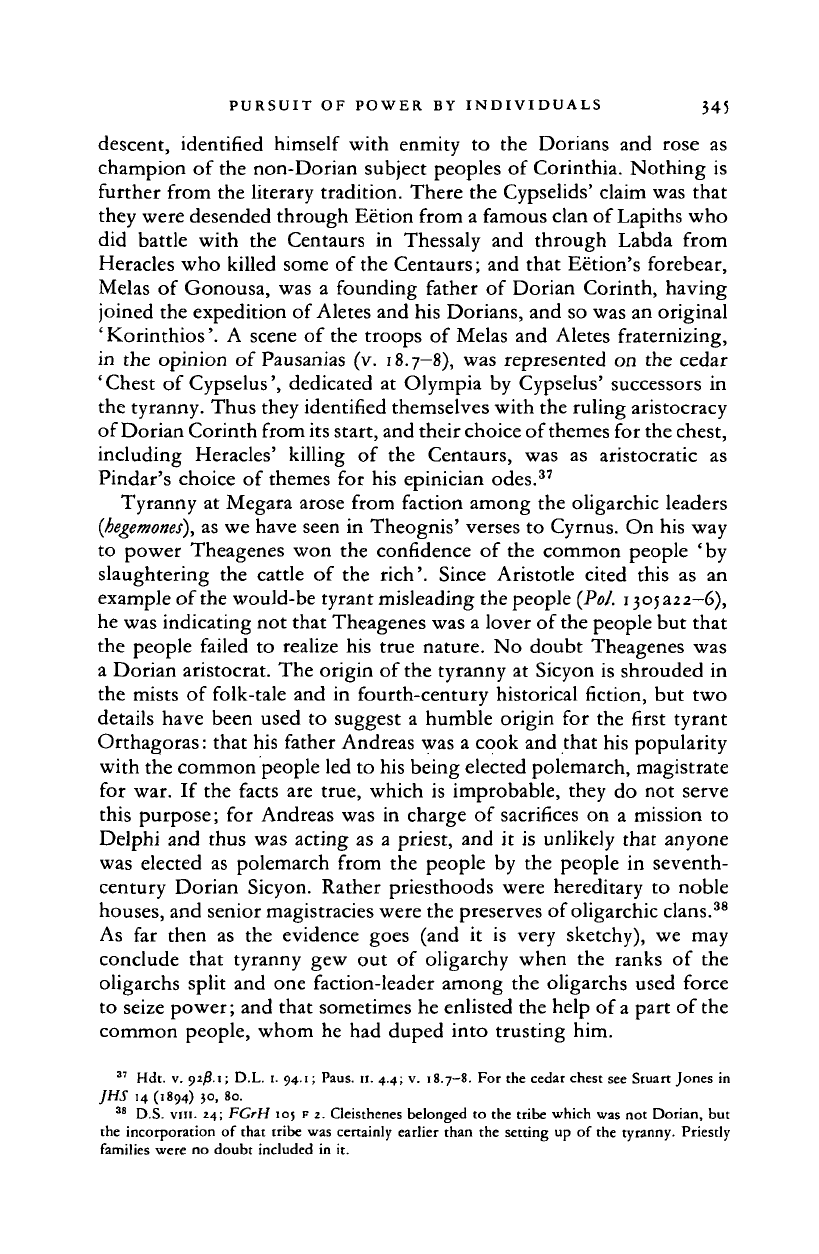
PURSUIT OF POWER BY INDIVIDUALS 345
descent, identified himself with enmity
to
the Dorians and rose
as
champion of the non-Dorian subject peoples of Corinthia. Nothing is
further from the literary tradition. There the Cypselids' claim was that
they were desended through Eetion from a famous clan of Lapiths who
did battle with the Centaurs
in
Thessaly and through Labda from
Heracles who killed some of the Centaurs; and that Eetion's forebear,
Melas of Gonousa, was
a
founding father of Dorian Corinth, having
joined the expedition of Aletes and his Dorians, and so was an original
'Korinthios'. A scene of the troops of Melas and Aletes fraternizing,
in the opinion of Pausanias (v. 18.7-8), was represented on the cedar
'Chest of Cypselus', dedicated at Olympia by Cypselus' successors in
the tyranny. Thus they identified themselves with the ruling aristocracy
of Dorian Corinth from its start, and their choice of themes for the chest,
including Heracles' killing
of
the Centaurs, was
as
aristocratic
as
Pindar's choice of themes for his epinician odes.
37
Tyranny at Megara arose from faction among the oligarchic leaders
{hegemones),
as we have seen in Theognis' verses to Cyrnus. On his way
to power Theagenes won the confidence of the common people ' by
slaughtering the cattle
of
the rich'. Since Aristotle cited this
as an
example of the would-be tyrant misleading the people
{Pol.
1305322-6),
he was indicating not that Theagenes was a lover of the people but that
the people failed to realize his true nature. No doubt Theagenes was
a Dorian aristocrat. The origin of the tyranny at Sicyon is shrouded in
the mists of folk-tale and in fourth-century historical fiction, but two
details have been used to suggest a humble origin for the first tyrant
Orthagoras: that his father Andreas was a cook and that his popularity
with the common people led to his being elected polemarch, magistrate
for war.
If
the facts are true, which is improbable, they do not serve
this purpose; for Andreas was in charge of sacrifices on a mission
to
Delphi and thus was acting as a priest, and
it
is unlikely that anyone
was elected as polemarch from the people by the people in seventh-
century Dorian Sicyon. Rather priesthoods were hereditary
to
noble
houses, and senior magistracies were the preserves of oligarchic clans.
38
As
far
then
as
the evidence goes (and
it is
very sketchy), we may
conclude that tyranny gew out
of
oligarchy when the ranks
of
the
oligarchs split and one faction-leader among the oligarchs used force
to seize power; and that sometimes he enlisted the help of
a
part of the
common people, whom he had duped into trusting him.
37
Hdt. v.
92/3.1;
D.L.
i.
94.1; Paus. 11.
4.4; v.
18.7-8.
For the
cedar chest
see
Stuart Jones
in
JHS
14
(1894)
jo, 80.
38
D.S. vrn. 24;
FGrH IOJ
F 2.
Cleisthenes belonged
to the
tribe which
was not
Dorian,
but
the incorporation
of
that tribe
was
certainly earlier than
the
setting
up of the
tyranny. Priestly
families were
no
doubt included
in it.
Cambridge Histories Online © Cambridge University Press, 2008
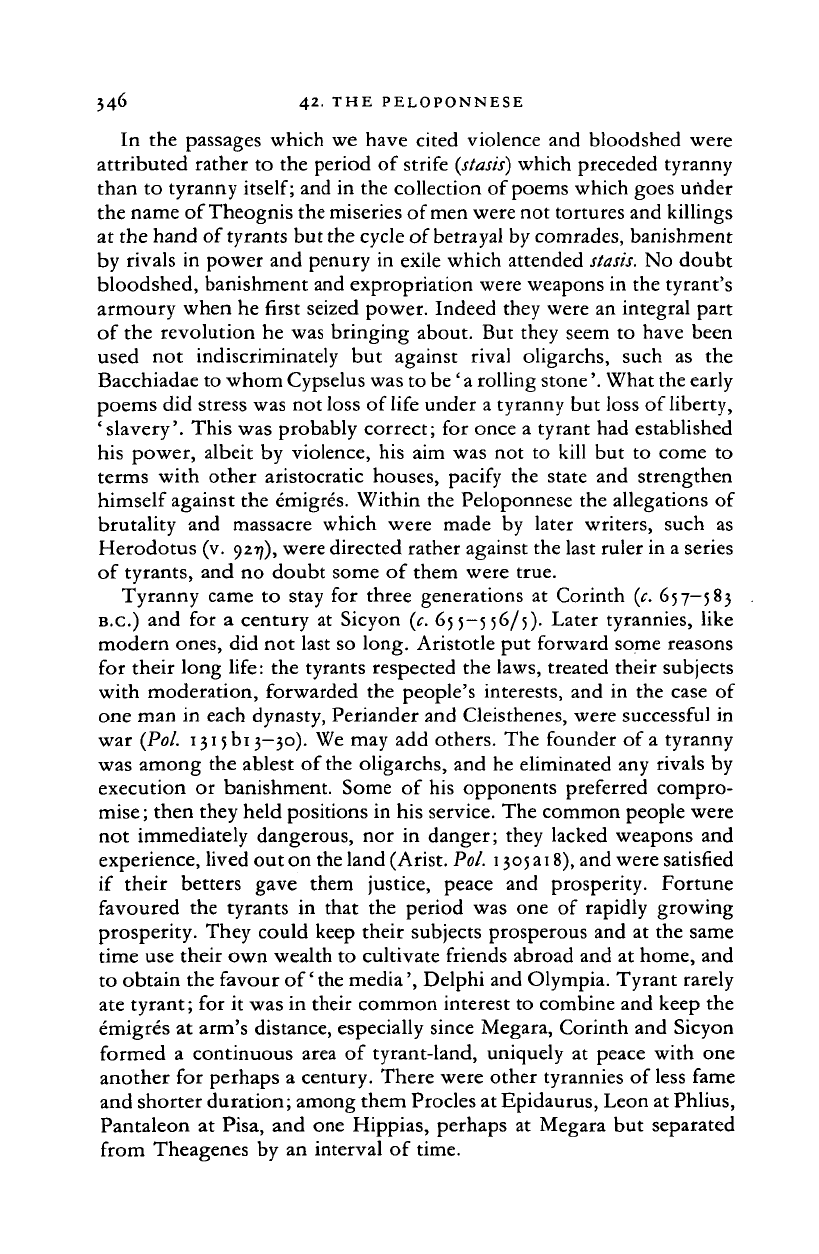
346 4
2
- THE PELOPONNESE
In the passages which we have cited violence and bloodshed were
attributed rather to the period of strife
{stasis)
which preceded tyranny
than to tyranny
itself;
and in the collection of poems which goes under
the name of Theognis the miseries of men were not tortures and killings
at the hand of tyrants but the cycle of betrayal by comrades, banishment
by rivals in power and penury in exile which attended
stasis.
No doubt
bloodshed, banishment and expropriation were weapons in the tyrant's
armoury when he first seized power. Indeed they were an integral part
of the revolution he was bringing about. But they seem
to
have been
used
not
indiscriminately
but
against rival oligarchs, such
as the
Bacchiadae to whom Cypselus was to be'
a
rolling stone'. What the early
poems did stress was not loss of life under a tyranny but loss of liberty,
'slavery'. This was probably correct; for once a tyrant had established
his power, albeit by violence, his aim was not
to
kill but
to
come
to
terms with other aristocratic houses, pacify the state and strengthen
himself against the emigres. Within the Peloponnese the allegations of
brutality
and
massacre which were made
by
later writers, such
as
Herodotus (v. 927;), were directed rather against the last ruler in a series
of tyrants, and no doubt some
of
them were true.
Tyranny came
to
stay for three generations
at
Corinth
{c.
657-583
B.C.) and for
a
century
at
Sicyon
{c.
655-556/5). Later tyrannies, like
modern ones, did not last so long. Aristotle put forward some reasons
for their long life: the tyrants respected the laws, treated their subjects
with moderation, forwarded the people's interests, and
in
the case
of
one man in each dynasty, Periander and Cleisthenes, were successful in
war
{Pol.
1315b!
3—30).
We may add others. The founder of a tyranny
was among the ablest of the oligarchs, and he eliminated any rivals by
execution
or
banishment. Some
of
his opponents preferred compro-
mise;
then they held positions in his service. The common people were
not immediately dangerous, nor
in
danger; they lacked weapons and
experience, lived out on the land (Arist.
Pol.
1305318), and were satisfied
if their betters gave them justice, peace
and
prosperity. Fortune
favoured
the
tyrants
in
that the period was one
of
rapidly growing
prosperity. They could keep their subjects prosperous and at the same
time use their own wealth to cultivate friends abroad and at home, and
to obtain the favour of'the media', Delphi and Olympia. Tyrant rarely
ate tyrant; for it was in their common interest to combine and keep the
emigres at arm's distance, especially since Megara, Corinth and Sicyon
formed
a
continuous area
of
tyrant-land, uniquely
at
peace with one
another for perhaps
a
century. There were other tyrannies of less fame
and shorter duration; among them Procles at Epidaurus, Leon at Phlius,
Pantaleon
at
Pisa, and one Hippias, perhaps
at
Megara but separated
from Theagenes by an interval
of
time.
Cambridge Histories Online © Cambridge University Press, 2008
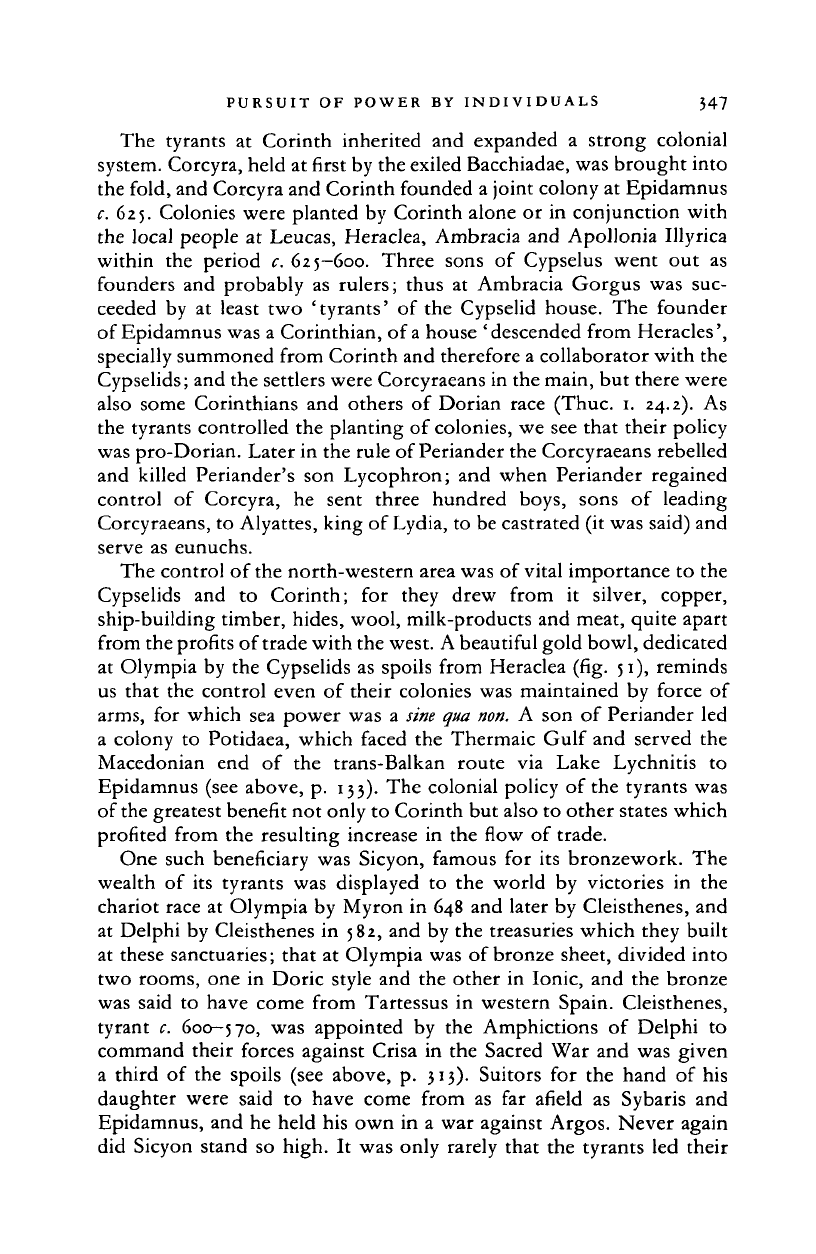
PURSUIT OF POWER BY INDIVIDUALS 347
The tyrants
at
Corinth inherited
and
expanded
a
strong colonial
system. Corcyra, held at first by the exiled Bacchiadae, was brought into
the fold, and Corcyra and Corinth founded a joint colony at Epidamnus
c. 625. Colonies were planted by Corinth alone
or
in conjunction with
the local people
at
Leucas, Heraclea, Ambracia and Apollonia Illyrica
within
the
period c. 625-600. Three sons
of
Cypselus went
out as
founders and probably
as
rulers; thus
at
Ambracia Gorgus was suc-
ceeded
by at
least two 'tyrants'
of
the Cypselid house. The founder
of Epidamnus was a Corinthian, of
a
house 'descended from Heracles',
specially summoned from Corinth and therefore a collaborator with the
Cypselids; and the settlers were Corcyraeans in the main, but there were
also some Corinthians and others
of
Dorian race (Thuc.
1.
24.2).
As
the tyrants controlled the planting of colonies, we see that their policy
was pro-Dorian. Later in the rule of Periander the Corcyraeans rebelled
and killed Periander's son Lycophron; and when Periander regained
control
of
Corcyra,
he
sent three hundred boys, sons
of
leading
Corcyraeans, to Alyattes, king of Lydia, to be castrated (it was said) and
serve as eunuchs.
The control of the north-western area was of vital importance to the
Cypselids
and to
Corinth;
for
they drew from
it
silver, copper,
ship-building timber, hides, wool, milk-products and meat, quite apart
from the profits of trade with the west. A beautiful gold bowl, dedicated
at Olympia by the Cypselids as spoils from Heraclea (fig. 51), reminds
us that the control even
of
their colonies was maintained
by
force
of
arms,
for
which sea power was
a
sine qua
non.
A
son
of
Periander led
a colony
to
Potidaea, which faced the Thermaic Gulf and served
the
Macedonian
end of the
trans-Balkan route
via
Lake Lychnitis
to
Epidamnus (see above, p. 133). The colonial policy
of
the tyrants was
of the greatest benefit not only to Corinth but also to other states which
profited from the resulting increase
in
the flow
of
trade.
One such beneficiary was Sicyon, famous
for
its bronzework.
The
wealth
of
its tyrants was displayed
to the
world
by
victories
in the
chariot race
at
Olympia by Myron
in
648 and later by Cleisthenes, and
at Delphi by Cleisthenes
in
582, and by the treasuries which they built
at these sanctuaries; that
at
Olympia was of bronze sheet, divided into
two rooms, one
in
Doric style and the other in Ionic, and the bronze
was said
to
have come from Tartessus
in
western Spain. Cleisthenes,
tyrant c. 600-570, was appointed
by the
Amphictions
of
Delphi
to
command their forces against Crisa
in
the Sacred War and was given
a third
of
the spoils (see above,
p.
313). Suitors
for the
hand
of
his
daughter were said
to
have come from
as far
afield
as
Sybaris
and
Epidamnus, and he held his own in
a
war against Argos. Never again
did Sicyon stand
so
high.
It
was only rarely that the tyrants led their
Cambridge Histories Online © Cambridge University Press, 2008
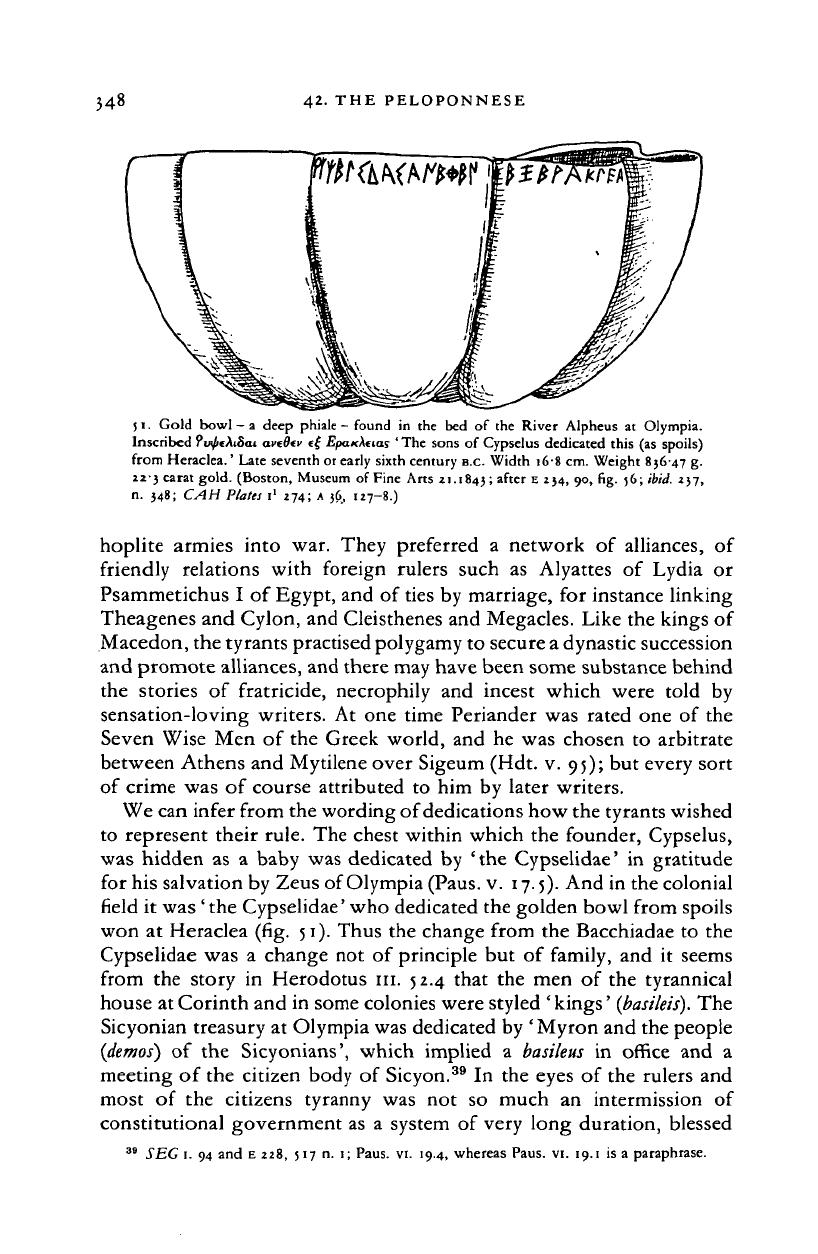
348
42.
THE PELOPONNESE
51.
Gold bowl - a deep phiale - found in the bed of the River Alpheus at Olympia.
Inscribed ?w/if AiSai aviBtv cf EpaxXeia; ' The sons of Cypselus dedicated this (as spoils)
from Heraclea.' Late seventh or early sixth century B.C. Width 168 cm. Weight 85647 g.
223 carat gold. (Boston, Museum of Fine Arts 21.1843
'>
after
E l
i4< 9°> fy>- 56; 'bid. 257,
n. 348; CAH Plates i
1
274; A 36, 127-8.)
hoplite armies into war. They preferred a network of alliances, of
friendly relations with foreign rulers such as Alyattes of Lydia or
Psammetichus I of Egypt, and of ties by marriage, for instance linking
Theagenes and Cylon, and Cleisthenes and Megacles. Like the kings of
Macedon, the tyrants practised polygamy to secure a dynastic succession
and promote alliances, and there may have been some substance behind
the stories of fratricide, necrophily and incest which were told by
sensation-loving writers. At one time Periander was rated one of the
Seven Wise Men of the Greek world, and he was chosen to arbitrate
between Athens and Mytilene over Sigeum (Hdt. v. 95); but every sort
of crime was of course attributed to him by later writers.
We can infer from the wording of dedications how the tyrants wished
to represent their rule. The chest within which the founder, Cypselus,
was hidden as a baby was dedicated by 'the Cypselidae' in gratitude
for his salvation by Zeus of Olympia (Paus. v. 17.5). And in the colonial
field it was ' the Cypselidae' who dedicated the golden bowl from spoils
won at Heraclea (fig. 51). Thus the change from the Bacchiadae to the
Cypselidae was a change not of principle but of family, and it seems
from the story in Herodotus in.
5
2.4 that the men of the tyrannical
house at Corinth and in some colonies were styled 'kings'
[basileis).
The
Sicyonian treasury at Olympia was dedicated by ' Myron and the people
{demos)
of the Sicyonians', which implied a
basileus
in office and a
meeting of the citizen body of Sicyon.
39
In the eyes of the rulers and
most of the citizens tyranny was not so much an intermission of
constitutional government as a system of very long duration, blessed
39
SEC 1. 94 and E 228, 517 n. 1; Paus. vi. 19.4, whereas Paus. vi. 19.1 is a paraphrase.
Cambridge Histories Online © Cambridge University Press, 2008
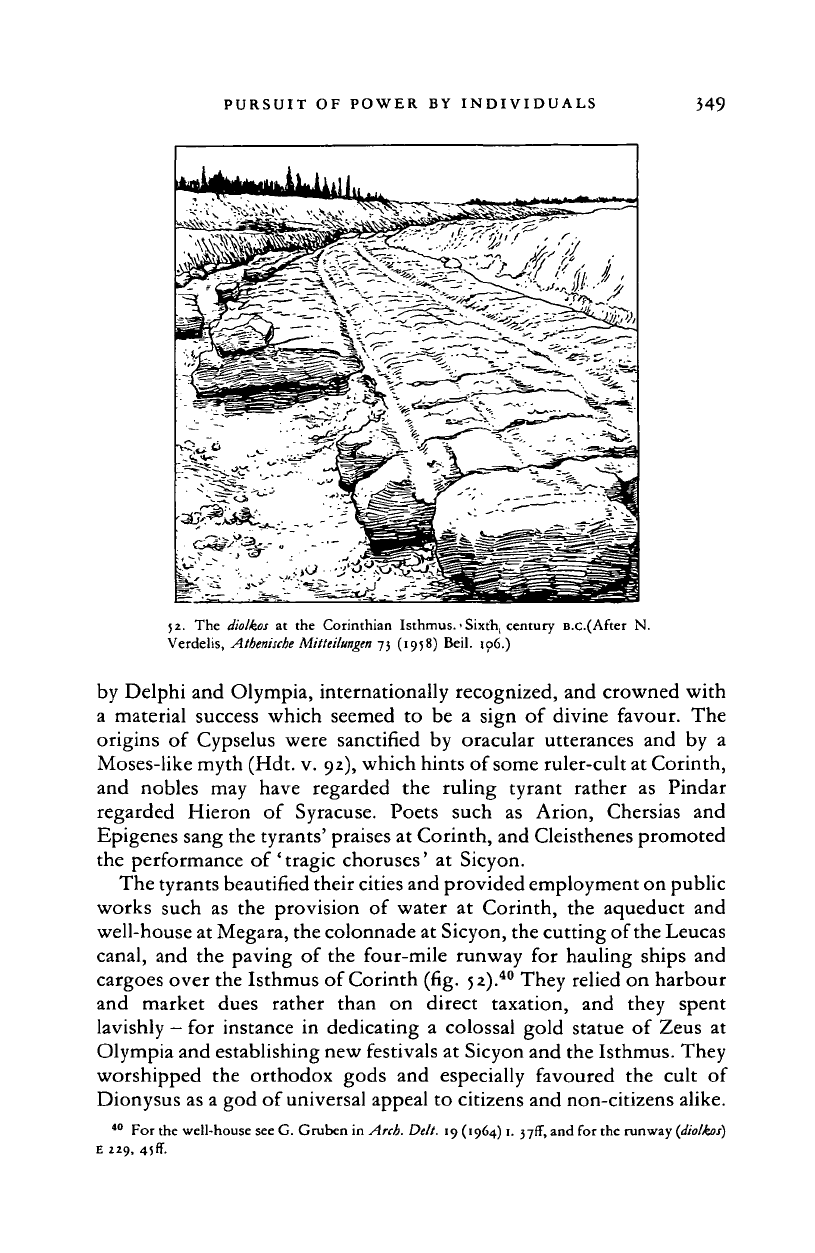
PURSUIT
OF
POWER
BY
INDIVIDUALS
349
i^^^^^^^^Sr*.
52.
The
diolkos
at the
Corinthian Isthmus.
>
Sixth, century B.C.(After
N.
Verdelis,
Atbenische Mitttilungen
73
(1958) Beil.
106.)
by Delphi
and
Olympia, internationally recognized,
and
crowned with
a material success which seemed
to be a
sign
of
divine favour.
The
origins
of
Cypselus were sanctified
by
oracular utterances
and by
a
Moses-like myth (Hdt.
v.
92), which hints
of
some
ruler-cult
at
Corinth,
and nobles
may
have regarded
the
ruling tyrant rather
as
Pindar
regarded Hieron
of
Syracuse. Poets such
as
Arion, Chersias
and
Epigenes sang
the
tyrants' praises
at
Corinth,
and
Cleisthenes promoted
the performance
of
'tragic choruses'
at
Sicyon.
The tyrants beautified their cities and provided employment on public
works such
as the
provision
of
water
at
Corinth,
the
aqueduct
and
well-house
at
Megara, the colonnade
at
Sicyon, the cutting of the Leucas
canal,
and the
paving
of the
four-mile runway
for
hauling ships
and
cargoes over
the
Isthmus
of
Corinth
(fig.
52).
40
They relied
on
harbour
and market dues rather than
on
direct taxation,
and
they spent
lavishly
—
for
instance
in
dedicating
a
colossal gold statue
of
Zeus
at
Olympia
and
establishing new festivals
at
Sicyon
and the
Isthmus. They
worshipped
the
orthodox gods
and
especially favoured
the
cult
of
Dionysus as
a god of
universal appeal
to
citizens
and
non-citizens alike.
40
For the
well-house see
G.
Gruben
in
Arch. Delt. 19 (1964)
1.
37ff, and for the
runway
{diolkos)
E 229,
4jff.
Cambridge Histories Online © Cambridge University Press, 2008
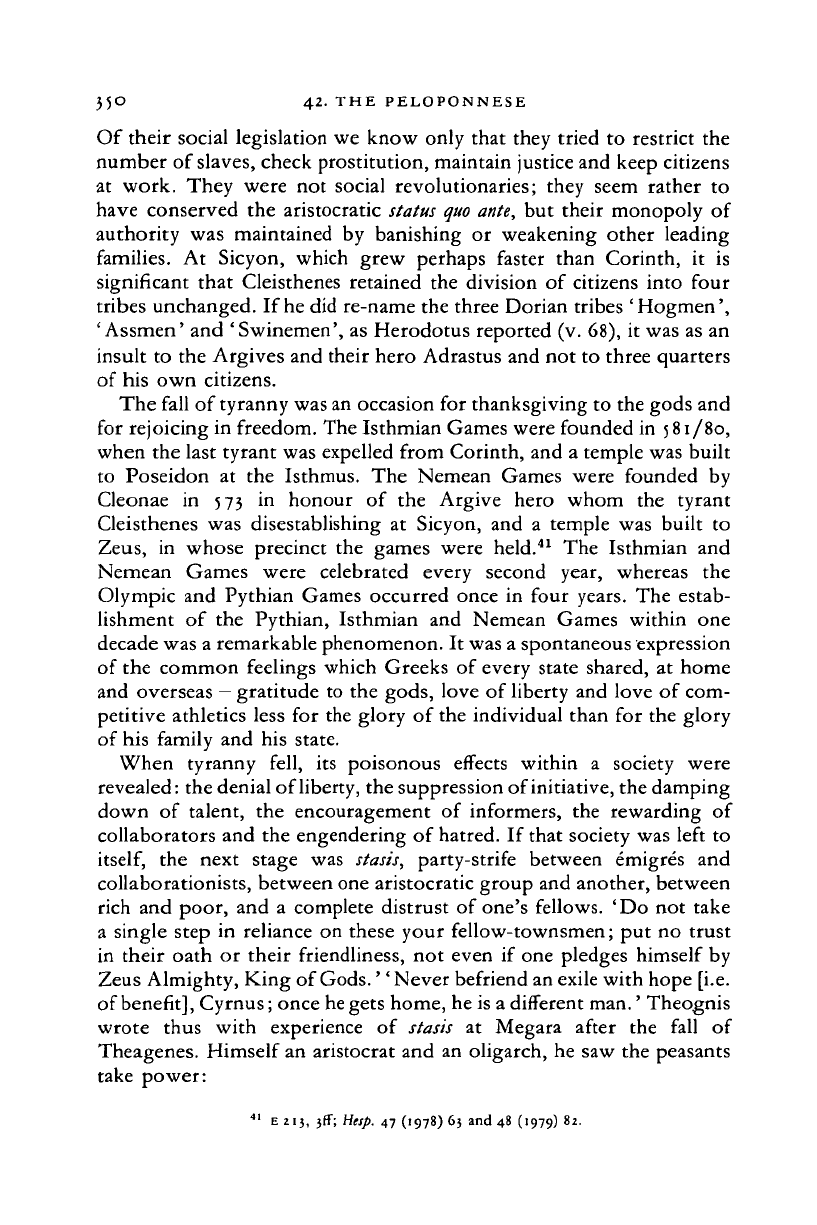
35° 4
2
-
THE
PELOPONNESE
Of their social legislation we know only that they tried to restrict the
number of slaves, check prostitution, maintain justice and keep citizens
at work. They were not social revolutionaries; they seem rather to
have conserved the aristocratic status
quo
ante,
but their monopoly of
authority was maintained by banishing or weakening other leading
families.
At
Sicyon, which grew perhaps faster than Corinth,
it is
significant that Cleisthenes retained the division of citizens into four
tribes unchanged. If he did re-name the three Dorian tribes 'Hogmen',
'Assmen' and 'Swinemen', as Herodotus reported (v. 68), it was as an
insult to the Argives and their hero Adrastus and not to three quarters
of his own citizens.
The fall of tyranny was an occasion for thanksgiving to the gods and
for rejoicing in freedom. The Isthmian Games were founded in 581/80,
when the last tyrant was expelled from Corinth, and a temple was built
to Poseidon
at
the Isthmus. The Nemean Games were founded by
Cleonae
in
573
in
honour
of
the Argive hero whom the tyrant
Cleisthenes was disestablishing at Sicyon, and
a
temple was built to
Zeus,
in
whose precinct the games were held.
41
The Isthmian and
Nemean Games were celebrated every second year, whereas
the
Olympic and Pythian Games occurred once in four years. The estab-
lishment of the Pythian, Isthmian and Nemean Games within one
decade was a remarkable phenomenon. It was a spontaneous expression
of the common feelings which Greeks of every state shared, at home
and overseas
-
gratitude to the gods, love of liberty and love of com-
petitive athletics less for the glory of the individual than for the glory
of his family and his state.
When tyranny fell, its poisonous effects within
a
society were
revealed: the denial of liberty, the suppression of initiative, the damping
down
of
talent, the encouragement of informers, the rewarding of
collaborators and the engendering of hatred. If that society was left to
itself,
the next stage was stasis, party-strife between emigres and
collaborationists, between one aristocratic group and another, between
rich and poor, and a complete distrust of one's fellows. 'Do not take
a single step in reliance on these your fellow-townsmen; put no trust
in their oath or their friendliness, not even if one pledges himself by
Zeus Almighty, King of Gods.'' Never befriend an exile with hope [i.e.
of
benefit],
Cyrnus; once he gets home, he is a different man.' Theognis
wrote thus with experience
of
stasis
at
Megara after the fall
of
Theagenes. Himself an aristocrat and an oligarch, he saw the peasants
take power:
41
E 213, 3(f; Hesp. 47 (1978) 63 and 48 (1979) 82.
Cambridge Histories Online © Cambridge University Press, 2008
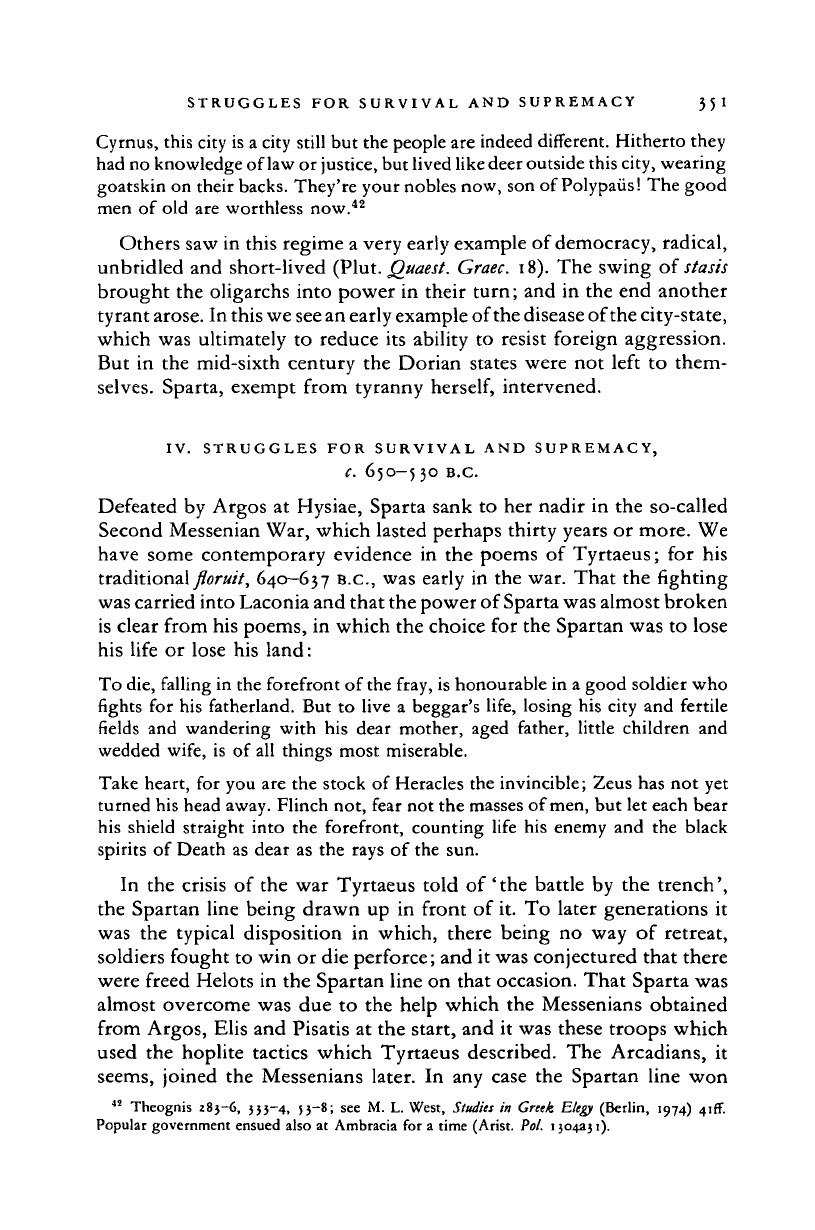
STRUGGLES FOR SURVIVAL AND SUPREMACY 351
Cyrnus, this city is
a
city still but the people are indeed different. Hitherto they
had no knowledge of
law
or
justice,
but lived
like
deer outside this
city,
wearing
goatskin on their
backs.
They're your nobles now, son of
Polypaiis!
The good
men of old are worthless now.
42
Others saw in this regime a very early example of democracy, radical,
unbridled and short-lived (Plut.
Quaest.
Graec.
18). The swing of
stasis
brought the oligarchs into power in their turn; and in the end another
tyrant
arose.
In this we
see
an early example of the disease of the city-state,
which was ultimately to reduce its ability to resist foreign aggression.
But in the mid-sixth century the Dorian states were not left to them-
selves. Sparta, exempt from tyranny
herself,
intervened.
IV. STRUGGLES FOR SURVIVAL AND SUPREMACY,
C. 650-530 B.C.
Defeated by Argos at Hysiae, Sparta sank to her nadir in the so-called
Second Messenian War, which lasted perhaps thirty years or more. We
have some contemporary evidence in the poems of Tyrtaeus; for his
traditional floruit, 640—637 B.C., was early in the war. That the fighting
was carried into Laconia and that the power of Sparta was almost broken
is clear from his poems, in which the choice for the Spartan was to lose
his life or lose his land:
To die, falling in the forefront of
the
fray, is honourable in
a
good soldier who
fights for his fatherland. But to live a beggar's life, losing his city and fertile
fields and wandering with his dear mother, aged father, little children and
wedded wife, is of all things most miserable.
Take heart, for you are the stock of Heracles the invincible; Zeus has not yet
turned his head away. Flinch not, fear not the masses of men, but let each bear
his shield straight into the forefront, counting life his enemy and the black
spirits of Death as dear as the rays of the sun.
In the crisis of the war Tyrtaeus told of 'the battle by the trench',
the Spartan line being drawn up in front of it. To later generations
it
was the typical disposition
in
which, there being no way
of
retreat,
soldiers fought to win or die perforce; and it was conjectured that there
were freed Helots in the Spartan line on that occasion. That Sparta was
almost overcome was due to the help which the Messenians obtained
from Argos, Elis and Pisatis at the start, and it was these troops which
used the hoplite tactics which Tyrtaeus described. The Arcadians,
it
seems, joined the Messenians later.
In
any case the Spartan line won
42
Theognis a83~6, 533-4, 53-8;
see
M. L. West, Studies in Greek Elegy (Berlin, 1974)
4iff.
Popular government ensued also at Ambracia for a time (Arist. Pol. 1304231).
Cambridge Histories Online © Cambridge University Press, 2008
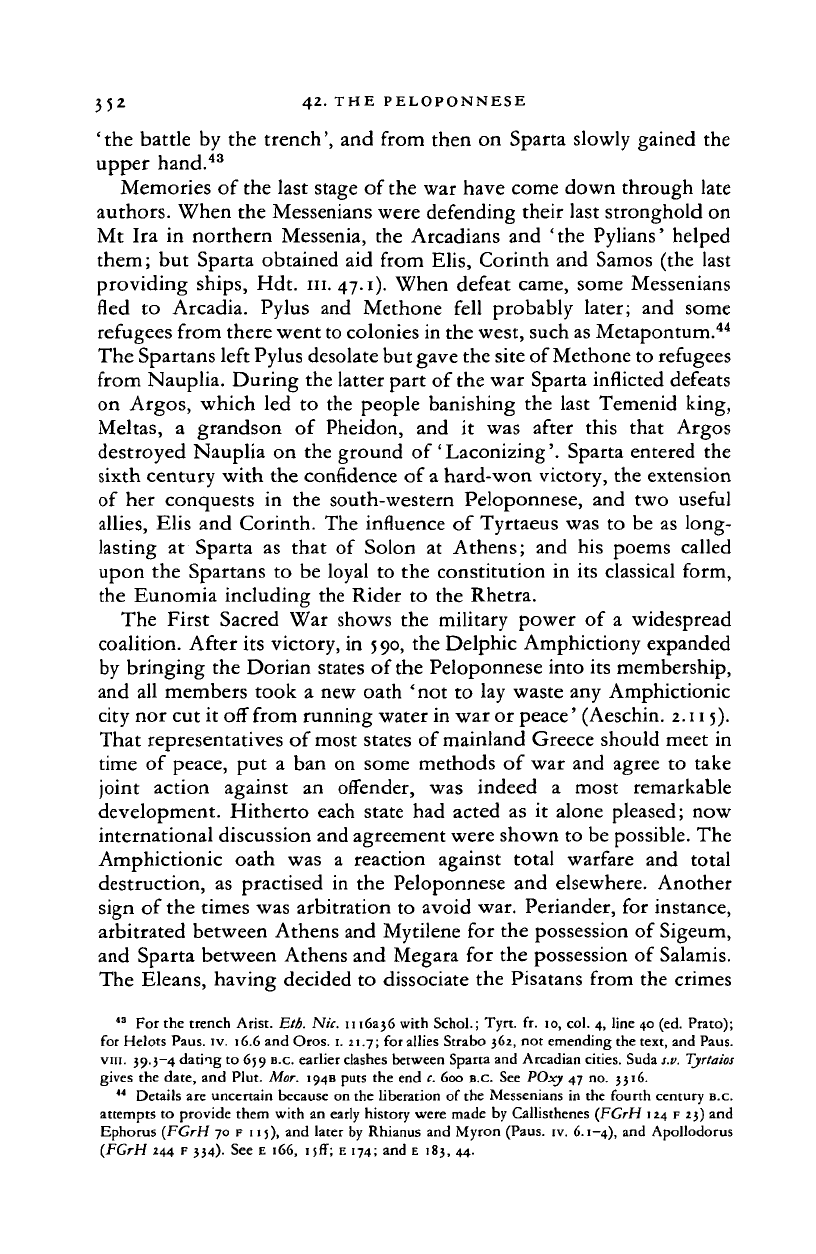
}52 4
2
- THE PELOPONNESE
'the battle
by the
trench',
and
from then
on
Sparta slowly gained
the
upper hand.
43
Memories
of
the last stage
of
the war have come down through late
authors. When the Messenians were defending their last stronghold on
Mt
Ira in
northern Messenia,
the
Arcadians
and 'the
Pylians' helped
them;
but
Sparta obtained
aid
from Elis, Corinth
and
Samos
(the
last
providing ships,
Hdt.
in. 47.1). When defeat came, some Messenians
fled to Arcadia. Pylus
and
Methone fell probably later;
and
some
refugees from there went to colonies in the west, such as Metapontum.
44
The Spartans left Pylus desolate but gave the site of Methone to refugees
from Nauplia. During the latter part
of
the war Sparta inflicted defeats
on Argos, which
led to the
people banishing
the
last Temenid king,
Meltas,
a
grandson
of
Pheidon,
and
it
was
after this that Argos
destroyed Nauplia
on
the ground of'Laconizing'. Sparta entered
the
sixth century with the confidence
of
a hard-won victory, the extension
of
her
conquests
in
the
south-western Peloponnese,
and two
useful
allies,
Elis
and
Corinth.
The
influence
of
Tyrtaeus was
to be as
long-
lasting
at
Sparta
as
that
of
Solon
at
Athens;
and his
poems called
upon
the
Spartans
to be
loyal
to the
constitution
in its
classical form,
the Eunomia including
the
Rider
to the
Rhetra.
The First Sacred
War
shows
the
military power
of a
widespread
coalition. After its victory,
in
5
90,
the Delphic Amphictiony expanded
by bringing the Dorian states
of
the Peloponnese into
its
membership,
and
all
members took
a
new oath
'not to lay
waste any Amphictionic
city nor cut
it off
from running water in war or peace' (Aeschin. 2.115).
That representatives
of
most states
of
mainland Greece should meet
in
time
of
peace,
put
a
ban on
some methods
of
war
and
agree
to
take
joint action against
an
offender,
was
indeed
a
most remarkable
development. Hitherto each state
had
acted
as
it
alone pleased;
now
international discussion and agreement were shown
to
be possible.
The
Amphictionic oath
was
a
reaction against total warfare
and
total
destruction,
as
practised
in the
Peloponnese
and
elsewhere. Another
sign
of
the times was arbitration
to
avoid war. Periander,
for
instance,
arbitrated between Athens and Mytilene
for
the possession
of
Sigeum,
and Sparta between Athens and Megara
for
the possession
of
Salamis.
The Eleans, having decided
to
dissociate
the
Pisatans from
the
crimes
43
For the trench Arist. Elb. Nic. iu6aj6 with Schol.; Tyrt.
fr.
10, col. 4, line 40 (ed. Prato);
for Helots Paus. iv. 16.6 and Oros. 1. 21.7; for allies Strabo 562, not emending the text, and Paus.
vni.
39.3-4 dating to 659 B.C. earlier clashes between Sparta and Arcadian cities. Suda
s.v.
Tyrtaios
gives the date, and Plut. Mor. 194B puts the end c. 600 B.C. See POxy 47 no. 3316.
44
Details are uncertain because on the liberation
of
the Messenians
in
the fourth century B.C.
attempts
to
provide them with an early history were made by Callisthenes (FGrH 124 F 23) and
Ephorus (FGrH 70
p n
j), and later by Rhianus and Myron (Paus. iv. 6.1-4), and Apollodorus
(FGrH 244 F 334). See E 166,
ijff;
E 174; and E 183, 44.
Cambridge Histories Online © Cambridge University Press, 2008
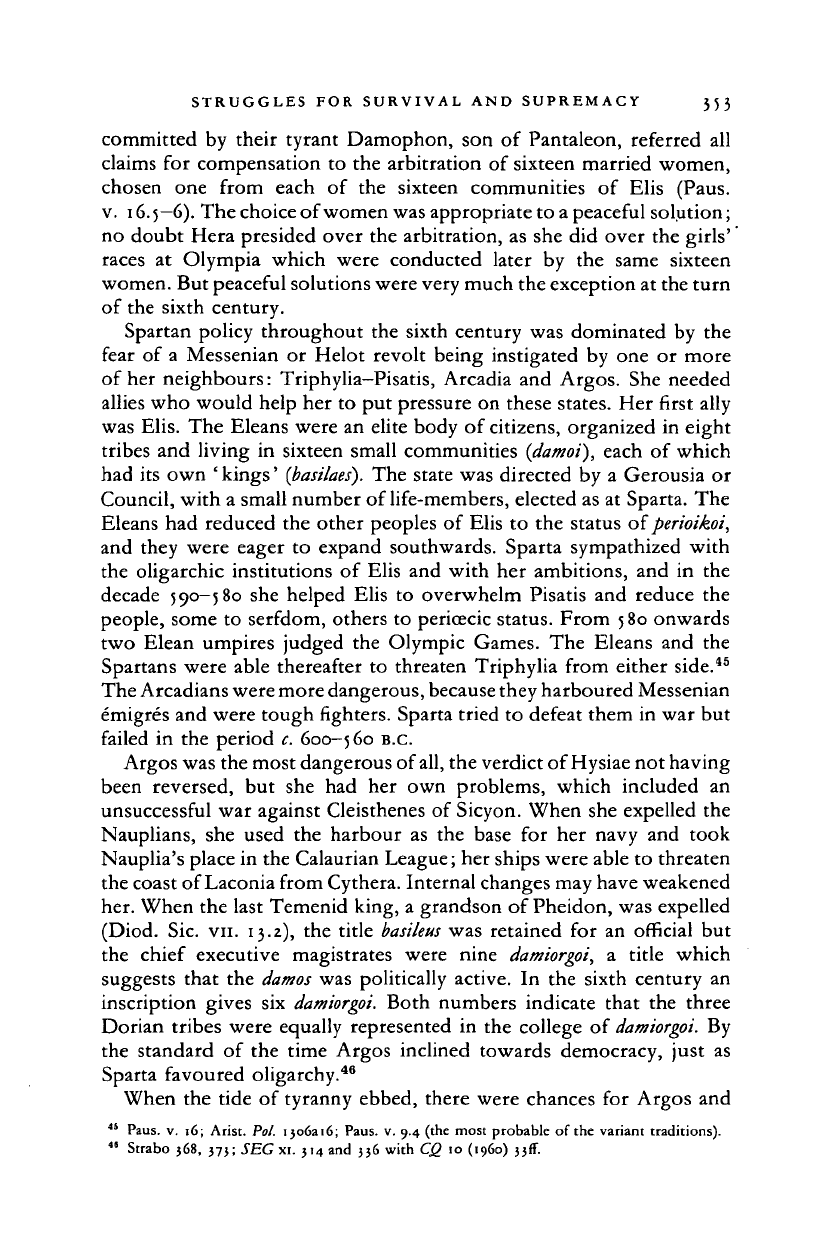
STRUGGLES FOR SURVIVAL AND SUPREMACY 353
committed by their tyrant Damophon, son
of
Pantaleon, referred
all
claims for compensation to the arbitration of sixteen married women,
chosen
one
from each
of the
sixteen communities
of
Elis (Paus.
v.
16.5—6).
The choice of women was appropriate to a peaceful solution;
no doubt Hera presided over the arbitration, as she did over the girls'
races
at
Olympia which were conducted later
by the
same sixteen
women. But peaceful solutions were very much the exception at the turn
of the sixth century.
Spartan policy throughout the sixth century was dominated by the
fear
of
a Messenian
or
Helot revolt being instigated by one
or
more
of her neighbours: Triphylia—Pisatis, Arcadia and Argos. She needed
allies who would help her to put pressure on these states. Her first ally
was Elis. The Eleans were an elite body of citizens, organized in eight
tribes and living
in
sixteen small communities
(damoi),
each of which
had its own 'kings'
(basilaes).
The state was directed by a Gerousia or
Council, with a small number of life-members, elected as at Sparta. The
Eleans had reduced the other peoples of Elis to the status of perioikoi,
and they were eager to expand southwards. Sparta sympathized with
the oligarchic institutions
of
Elis and with her ambitions, and
in
the
decade 590-580 she helped Elis
to
overwhelm Pisatis and reduce the
people, some to serfdom, others to pericecic status. From 580 onwards
two Elean umpires judged the Olympic Games. The Eleans and the
Spartans were able thereafter to threaten Triphylia from either side.
45
The Arcadians were more dangerous, because they harboured Messenian
emigres and were tough fighters. Sparta tried to defeat them in war but
failed in the period c. 600—560
B.C.
Argos was the most dangerous of
all,
the verdict of Hysiae not having
been reversed,
but
she had
her
own problems, which included
an
unsuccessful war against Cleisthenes of Sicyon. When she expelled the
Nauplians, she used the harbour as the base
for
her navy and took
Nauplia's place in the Calaurian League; her ships were able to threaten
the coast of Laconia from Cythera. Internal changes may have weakened
her. When the last Temenid king, a grandson of Pheidon, was expelled
(Diod. Sic.
VII.
13.2), the title
basileus
was retained for an official but
the chief executive magistrates were nine
damiorgoi,
a
title which
suggests that the
damos
was politically active.
In
the sixth century an
inscription gives six
damiorgoi.
Both numbers indicate that the three
Dorian tribes were equally represented in the college of
damiorgoi.
By
the standard
of
the time Argos inclined towards democracy, just
as
Sparta favoured oligarchy.
46
When the tide of tyranny ebbed, there were chances for Argos and
46
Paus.
v.
16; Arist. Pol. 1306316; Paus.
v.
9.4 (the most probable
of
the variant traditions).
" Strabo 368, 373;
SEG
xi. 314 and 336 with
CQ io
(i960) 33IT.
Cambridge Histories Online © Cambridge University Press, 2008
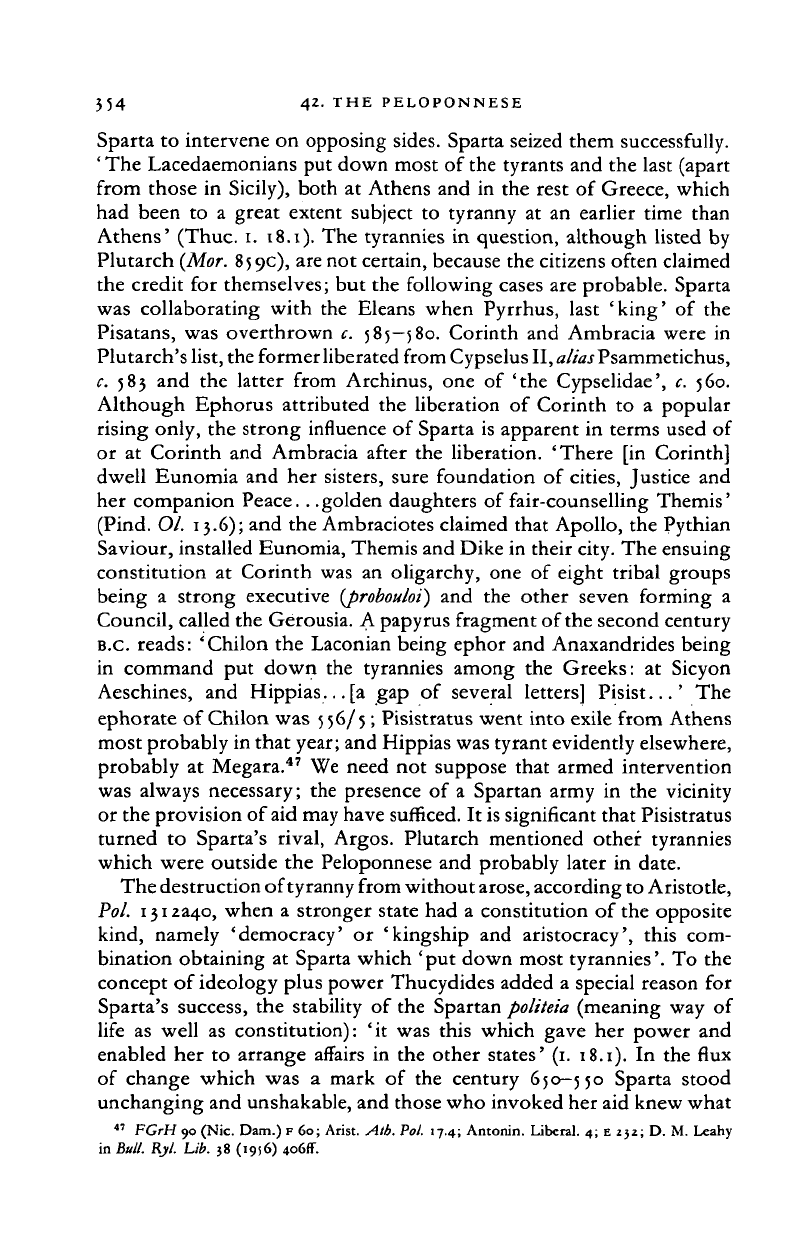
354 4
2
-
THE
PELOPONNESE
Sparta
to
intervene
on
opposing sides. Sparta seized them successfully.
' The Lacedaemonians put down most
of
the tyrants
and
the last (apart
from those
in
Sicily), both
at
Athens
and in the
rest
of
Greece, which
had been
to a
great extent subject
to
tyranny
at an
earlier time than
Athens' (Thuc.
i.
18.i).
The
tyrannies
in
question, although listed
by
Plutarch
(Mor.
859c), are not certain, because the citizens often claimed
the credit
for
themselves;
but
the following cases are probable. Sparta
was collaborating with
the
Eleans when Pyrrhus, last 'king'
of the
Pisatans,
was
overthrown c. 585—580. Corinth
and
Ambracia were
in
Plutarch's list, the former liberated from Cypselus II,a//aj-Psammetichus,
c.
583 and the
latter from Archinus,
one of 'the
Cypselidae',
c. 560.
Although Ephorus attributed
the
liberation
of
Corinth
to a
popular
rising only,
the
strong influence
of
Sparta
is
apparent
in
terms used
of
or
at
Corinth
and
Ambracia after
the
liberation. 'There
[in
Corinth]
dwell Eunomia
and her
sisters, sure foundation
of
cities, Justice
and
her companion Peace... golden daughters
of
fair-counselling Themis'
(Pind. Ol. 13.6);
and
the Ambraciotes claimed that Apollo,
the
Pythian
Saviour, installed Eunomia, Themis and Dike
in
their city. The ensuing
constitution
at
Corinth
was an
oligarchy,
one of
eight tribal groups
being
a
strong executive
(probouloi)
and the
other seven forming
a
Council, called the Gerousia. A papyrus fragment of the second century
B.C. reads: 'Chilon
the
Laconian being ephor
and
Anaxandrides being
in command
put
down
the
tyrannies among
the
Greeks:
at
Sicyon
Aeschines,
and
Hippias... [a
gap of
several letters] Pisist...'
The
ephorate
of
Chilon was 556/5; Pisistratus went into exile from Athens
most probably in that year; and Hippias was tyrant evidently elsewhere,
probably
at
Megara.
47
We
need
not
suppose that armed intervention
was always necessary;
the
presence
of a
Spartan army
in the
vicinity
or the provision
of
aid may have sufficed.
It
is significant that Pisistratus
turned
to
Sparta's rival, Argos. Plutarch mentioned other tyrannies
which were outside
the
Peloponnese
and
probably later
in
date.
The destruction of tyranny from without
arose,
according to Aristotle,
Pol. 1312340, when
a
stronger state
had a
constitution
of
the opposite
kind, namely 'democracy'
or
'kingship
and
aristocracy', this
com-
bination obtaining
at
Sparta which
'put
down most tyrannies'.
To the
concept
of
ideology plus power Thucydides added
a
special reason
for
Sparta's success,
the
stability
of
the Spartan
politeia
(meaning
way of
life
as
well
as
constitution):
'it was
this which gave
her
power
and
enabled
her to
arrange affairs
in the
other states' (1. 18.1).
In the
flux
of change which
was a
mark
of the
century 650—550 Sparta stood
unchanging and unshakable, and those who invoked her aid knew what
" FGrH 90 (Nic. Dam.)
F
60; Arist.
Atb.
Pol. 17.4; Antonin. Liberal.
4;
E
232;
D. M.
Leahy
in
hull.
Rjl. Lib. 38
(1956)
4o6ff.
Cambridge Histories Online © Cambridge University Press, 2008
